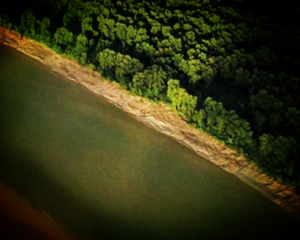What will change, as they come to understand that they do have them here? We can't be sure.
等到他们终于了解这里确实有这种树的时候,会有什么变化?我们不确定。
Our job right now is simply to listen and learn, and what we are hearing -- along with the worry -- is resilience.
此刻我们的工作就是倾听和学习,而我们听到的除了担忧,还有韧性。
I like to imagine a future in which mangroves help Bailique adapt: the relabeled forests attracting new government resources, perhaps, or a role in some future Brazilian carbon-exchange agreement.
我喜欢想像贝利克靠着红树林而调整适应的未来:可能是重新辨识出的森林带来新的政府资源,或是未来在巴西的某些碳交换协议中扮演某个角色。
The mangroves will spread as turbulent forces of water keep rearranging river-mouth soil; eventually, I think, these protective trees will be growing within and alongside villages.
当水流的扰动力量不断重新分布河口的土壤时,红树林也会跟着传播;我认为到了最后,这些具备保护力量的树林会在村子里面生长,也会沿着村子生长。
More roots holding back erosion, that is, in places where the mangroves do settle in. And more underwater nurseries for crabs and fish.
在红树林真的落地生根的地方,将会有更多根系防止土壤侵蚀,水下也会有更多给螃蟹和鱼类的育幼场。
When I say that I hope we researchers can offer information and support, as the archipelago's people learn to make use of the mangroves' presence, I want to be clear: There's no panacea here.
我希望在群岛居民学习如何利用红树林的存在时,研究人员可以提供信息和支持,但这样说的同时我也要声明:没有万灵丹。
Human-accelerated disruption is the most urgent threat imaginable not just in Bailique but across all of Amazonia and beyond.
因为人类而加速的破坏是我们能想到最迫切的威胁,不只是在贝利克,而是在整个亚马逊流域和其他地方。

It's worth remembering, however, that water and weather have always been natural disrupters at the river mouth, this giant place of Amazon-Atlantic exchange, and that the wisest people on the islands know it.
不过,值得记住的是,在河口地区、也就是亚马逊河和大西洋交接的巨大区域,水和气候向来都是天然扰动因素,岛上最明智的居民也都知道。
Felipe and I were in Chico's boat one day, heading into a channel toward our next village, when suddenly the boat stopped moving.
有一天,费利佩和我搭着奇柯的船驶进一条水道,要前往下一个村子时,船突然间就不动了。
Chico sighed. He didn't even look surprised. Then he jumped over the side, landed on his feet, and waded around back to push.
奇柯叹了口气,他看起来一点也不惊讶。然后他跳下船,涉水到船后方开始推。
Felipe and me: Wait, what? Chico: I missed the timing. Just barely, he said.
费利佩和我:等等,这是怎么了?奇柯:我错过时机了。就差一点点,他说。
This channel now fills and drains so fast that if your boat does not enter it at exactly the right window, you're stuck in watery grass.
这条水道现在涨落超快,如果船没有在准确的时机开进来,就会卡在水草里。
He'd learned the day's times from what people here call the fishermen channel, the daily conversation among Bailique boatmen -- shouted, usually, boat to boat across the top of the plume.
他是从当地人所谓的“渔民频道”得知当日时机的,渔民频道指的是贝利克船夫们的日常交谈,通常是在羽流上从一艘船对着另一艘船大喊进行。
But he'd gotten the times wrong. Or the Amazon had defied prediction, behaving even in this narrow archipelago passage as the most powerful river in the world.
但他弄错时间了。又或是亚马逊河不想让人预测,就算在这条狭窄的群岛水道中,还是展现出全世界最威猛大河的行为。
Felipe and I climbed over the side too, into warm water up to our ankles.
费利佩和我也爬下船,踏入深及脚踝的温暖河水中。
Mudou a agua, mudou a vida, I thought, and Chico nodded at us: Just keep pushing.
Mudou a agua, mudou a vida,我心想,而奇柯对我们点点头:继续推就对了。













